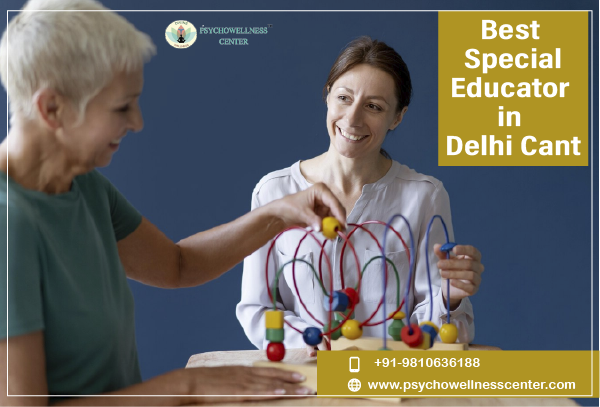Best Special Educator in Delhi Cantt

Special education plays a vital role in empowering children and individuals with diverse learning needs. Delhi Cantonment, known for its educational resources, is home to some of the finest special educators and top psychologists who specialize in addressing developmental, behavioral, and learning challenges. These professionals are dedicated to fostering growth, inclusion, and independence in individuals with special needs. Their holistic approach ensures that children can overcome barriers and achieve their highest potential.
Role of Special Educators
Special educators are trained to create personalized learning plans that cater to the unique needs of each child. They employ innovative teaching strategies, assistive technologies, and therapeutic techniques to support individuals in achieving their fullest potential. Beyond academic support, special educators help children build essential life skills, social abilities, and emotional resilience. By addressing cognitive, emotional, and social challenges, special educators build a nurturing environment where individuals can thrive. Moreover, they work closely with families and caregivers to provide guidance on how to extend support beyond the classroom, ensuring continuity in learning and development.
Top Psychologists in Delhi Cantonment
1. Dr. R. K. Suri
Dr. R. K. Suri is a renowned clinical psychologist with decades of experience in addressing developmental disorders and learning difficulties. His expertise in cognitive behavioural therapy and holistic treatment approaches has made a significant impact on the lives of children and families. He is known for providing evidence-based interventions tailored to individual needs. His work has also emphasized the importance of early diagnosis and intervention in mitigating long-term challenges.
2. Ms. Sakshi Dhankhar
Ms. Sakshi Dhankhar is a skilled counseling psychologist specializing in mental health challenges such as anxiety, depression, and learning disorders. She integrates therapeutic techniques like CBT, REBT, and mindfulness to promote personal growth and emotional stability in children and adolescents. Her empathetic approach fosters a safe space for children to express themselves and overcome their struggles.
3. Ms. Tanu Sangwan
Ms. Tanu Sangwan is a dedicated special educator with a focus on children with autism spectrum disorders, ADHD, and other neurodevelopmental conditions. Her compassionate approach and innovative teaching methodologies empower children to overcome barriers and achieve academic and social milestones. She is particularly adept at incorporating sensory integration techniques and play-based learning to engage young learners effectively.
4. Mr. Utkarsh Yadav
Mr. Utkarsh Yadav is a proficient psychologist who offers personalized interventions for children and adolescents facing learning and behavioural challenges. His commitment to fostering resilience and self-confidence in young individuals has garnered appreciation from families across Delhi Cantonment. He also provides workshops and group sessions to help children develop social skills and peer relationships.
Key Challenges in Special Education
Special education comes with its own set of challenges, including:
- Resource Constraints: Limited access to assistive technologies and trained professionals in some areas.
- Parental Involvement: Ensuring consistent support and understanding from parents can sometimes be difficult. Educating parents about their child’s needs and the importance of their role in the intervention process is important.
- Social Stigma: Overcoming societal misconceptions about children with special needs remains a hurdle. Advocacy and awareness campaigns are necessary to foster acceptance and inclusion.
- Individual Variability: Addressing the highly individualized nature of special education demands constant adaptation and innovation. Each child presents unique strengths and challenges, requiring a flexible and creative approach from educators.
Innovative Strategies in Special Education
To address these challenges, special educators employ various innovative strategies, such as:
- Technology Integration: Using apps, software, and devices to enhance learning and communication. Tools like speech-to-text software and visual learning aids have transformed the way children with special needs interact with their environment.
- Collaborative Models: Partnering with therapists, schools, and families to provide holistic support. Multidisciplinary teams work together to address the diverse needs of the child comprehensively.
- Experiential Learning: Incorporating real-world scenarios to make learning practical and relatable. Field trips, role-playing, and hands-on activities help children connect theoretical knowledge to everyday experiences.
- Flexible Curriculum Design: Adapting teaching methods and materials to suit diverse learning styles and needs. For example, incorporating visual aids for visual learners or tactile activities for kinesthetic learners ensures engagement and comprehension.
Importance of Early Intervention
Early intervention is crucial in addressing developmental delays and learning challenges. It significantly enhances the chances of achieving positive outcomes and helps children build a strong foundation for future learning and growth. Special educators in Delhi Cantonment focus on identifying and addressing these issues at the earliest stages, ensuring timely support and guidance. Research has consistently shown that children who receive early intervention services demonstrate improved academic performance, social skills, and self-confidence. Early diagnosis also enables parents to better understand their child’s needs and access resources promptly.
The Role of Family and Community
Families and communities play an integral role in the success of special education programs. When parents actively participate in their child’s learning journey, it creates a supportive and consistent environment. Community involvement, such as inclusive recreational activities and awareness programs, helps reduce stigma and fosters acceptance. Special educators often collaborate with families to provide training and resources, empowering them to support their child effectively.
Conclusion
Delhi Cantonment’s community of dedicated special educators and best psychologists ensures that every child receives the support they need to thrive. By leveraging their expertise and compassionate care, these professionals are paving the way for inclusive and empowered futures for individuals with special needs. Whether through tailored educational plans, therapeutic interventions, or collaborative efforts with families and schools, these experts are transforming lives. For families seeking expert guidance, the contributions of professionals like Dr. R. K. Suri, Ms. Sakshi Dhankhar, Ms. Tanu Sangwan, and Mr. Utkarsh Yadav stand as a testament to the transformative power of special education and mental health support. With continuous efforts from educators, families, and communities, the vision of a truly inclusive society can become a reality.
References
- American Psychological Association. (2020). Publication manual of the American Psychological Association (7th ed.). Washington, DC: Author.
- Gargiulo, R. M., & Metcalf, D. (2017). Teaching in today’s inclusive classrooms: A universal design for learning approach (3rd ed.). Cengage Learning.
- Hallahan, D. P., Kauffman, J. M., & Pullen, P. C. (2019). Exceptional learners: An introduction to special education (14th ed.). Pearson.
- Friend, M. (2022). Special education: Contemporary perspectives for school professionals (6th ed.). Pearson.
- Tomlinson, C. A. (2017). How to differentiate instruction in academically diverse classrooms (3rd ed.). ASCD.
Contributed by: Ms. Sakshi Dhankhar, Counselling psychologist




SHARE